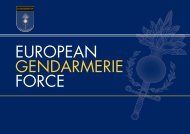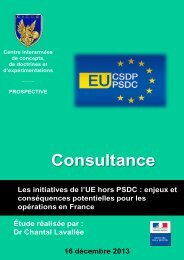Conference
science-research-bulletin-2013-conference
science-research-bulletin-2013-conference
You also want an ePaper? Increase the reach of your titles
YUMPU automatically turns print PDFs into web optimized ePapers that Google loves.
EUROPEAN POLICE SCIENCE AND RESEARCH BULLETIN<br />
SPECIAL CONFERENCE EDITION<br />
are so relatively simple, those individuals and<br />
groups with criminal intentions can easily take<br />
measures to avoid such criteria.<br />
Amnesty International would like to have a<br />
constructive discussion with police on that<br />
subject, but in many situations the sensitivity of<br />
the subject still prevents this from happening.<br />
SENSITIVE SUBJECTS: POLICE<br />
ACCOUNTABILITY AND IDENTIFICATION<br />
OF POLICE OFFICERS<br />
A subject of similar sensitivity is Amnesty<br />
International’s call in many countries to ascertain<br />
that police officers can be identified — either<br />
through name tags or number tags — including<br />
in the context of public assemblies. Here again,<br />
it seems that this request is perceived by many<br />
police officers as a personal accusation that<br />
treats them as potential ‘criminals’ and puts<br />
their personal security at risk, while Amnesty<br />
International considers this as an indispensable<br />
measure of transparency and public scrutiny.<br />
GETTING TO CHANGE<br />
Achieving and measuring effective change is<br />
sometimes another difficulty: even though a<br />
dialogue may be very open and trustful and<br />
human rights related problems are identified<br />
and acknowledged by the police themselves, this<br />
does not necessarily lead to effective change in<br />
the way policing is done — or — at least it is very<br />
difficult to get to know the precise improvement<br />
measures taken by the police. This, however, is<br />
essential to judge whether the dialogue is indeed<br />
as open, trustful and constructive as it may be<br />
described by those involved.<br />
KEEPING THE DISTANCE<br />
An important limitation to constructive dialogue<br />
also deserves to be mentioned: Amnesty<br />
International cannot assume responsibilities of<br />
the police; operational choices of how to do<br />
policing in a given context are the exclusive<br />
responsibility of the police. Thus, while it will<br />
always be possible to comment on the human<br />
rights consequences of specific policing<br />
approaches, Amnesty International cannot and<br />
will not discharge the police of their duty to<br />
make the appropriate operational choices and<br />
of the obligation to assume full responsibility for<br />
these choices.<br />
A similar consideration applies for training and<br />
human rights education of police officers. Too<br />
often, Amnesty International receives requests<br />
from law enforcement agencies to provide for<br />
large scale human rights education of police<br />
officers. However, in the first place, it is the<br />
responsibility of the police institutions themselves<br />
to ensure that all members of the agency know<br />
and understand human rights and are able<br />
to carry out their work in compliance with<br />
human rights. But even more importantly, it is<br />
Amnesty International’s strong belief that human<br />
rights education as a standalone activity is not<br />
conducive to better respect of and for human<br />
rights. It must be embedded in an overall culture<br />
of human rights respect within the institution, as<br />
demonstrated through human rights compliant<br />
policies and procedures as well the indispensable<br />
measures to enforce them, leaving no space for<br />
impunity in relation to violations of human rights.<br />
And finally, even where constructive dialogue<br />
takes place, it must always be clear from the<br />
onset that Amnesty International cannot and will<br />
not give up its watchdog function. When things<br />
go wrong, Amnesty International will still speak<br />
out and call for all necessary corrective measures<br />
in relation to human rights violations, including<br />
bringing those to justice who have committed<br />
serious human rights violations. Constructive<br />
dialogue cannot and will not go as far as putting<br />
Amnesty International’s independence and<br />
impartiality at risk.<br />
CONCLUSION<br />
As a conclusion, constructive dialogue between<br />
Amnesty International and the police:<br />
• is possible;<br />
• requires that both sides understand and<br />
respect each other’s function;<br />
• remains difficult on certain subjects; and<br />
• will not and may not affect Amnesty<br />
International’s watchdog function when it<br />
comes to human rights violations.<br />
61





